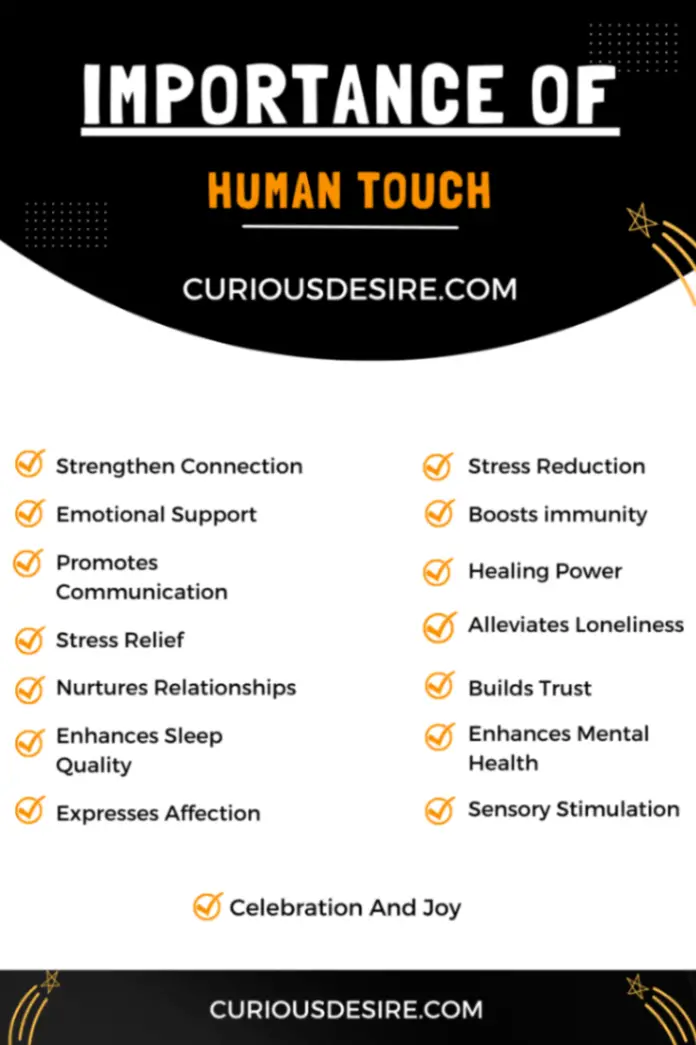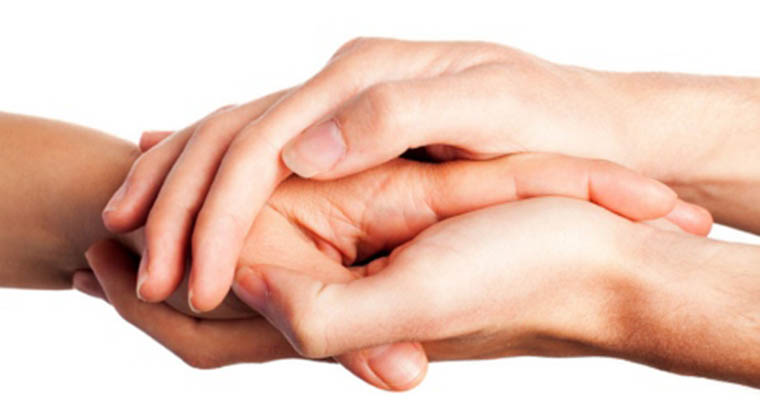Touch, the first sense to develop in the human fetus, remains one of our most crucial means of communication and perception throughout our lives.
In a world increasingly dominated by digital interactions, the profound significance of human touch often fades into the background. Yet, this fundamental aspect of human connection holds unparalleled power in shaping our physical, emotional, and psychological well-being
The importance of human touch transcends mere physical interactions; it is a cornerstone of human connection, a language of compassion, and a critical element in the development and maintenance of healthy relationships.
In this blog, we will explore the significance of human touch in various aspects of our lives and how it contributes to our overall health and happiness.
5 most common reasons for the importance of human touch
- Connection and Bonding
- Enhances Sleep Quality
- Improves Mental Health
- Provides Emotional Support
- Healing Power

1. Connection and Bonding
Human touch is the language of connection. It fosters a sense of connection and bonding between people.
From a gentle hug to a reassuring pat on the back, physical contact helps forge emotional bonds. It’s a silent communicator of:
- Empathy
- Love
- Care
- Harmony
2. Stress Reduction
The power of touch to reduce stress cannot be overstated.
Touch has a calming effect on the mind and body. The simple act of holding hands with a loved one can act as a powerful stress buster, making challenges seem more manageable.
Studies have shown that physical contact can lower cortisol levels, promote relaxation, and reduce anxiety.
3. Emotional Support
At its core, touch is a basic human need, integral to our well-being and emotional health. It can convey empathy, compassion, and comfort.
In times of distress, a comforting touch can speak volumes and provide emotional support like no words can.
4. Boosts Immunity
Believe it or not, human touch can boost our immune system.
Research indicates that regular hugs and physical contact can lead to increased production of white blood cells, helping to fend off illness.
5. Communication
Touch can communicate messages that words alone cannot.
From a pat on the shoulder to a high-five, touch often conveys encouragement, approval, or camaraderie in a way that verbal communication cannot.
It can express support, love, caution, or solidarity, enhancing our ability to communicate with those around us. This non-verbal communication builds stronger relationships and fosters a sense of belonging.

6. Healing Power
Touch therapy, including massage, can accelerate the healing process and alleviate pain.
It does so by improving circulation, reducing inflammation, and promoting relaxation, demonstrating touch’s powerful physiological effects.
There’s a reason why healthcare professionals emphasize the importance of the human touch in patient care. Studies have shown that touch can aid in the healing process, accelerating recovery and reducing pain perception.
7. Stress Relief for Babies
Human touch plays a crucial role in infant development.
The act of holding, cuddling, and caressing babies not only promotes emotional well-being but also aids in regulating physiological functions and reducing stress in infants.
In children, touch plays a crucial role in cognitive development. Through tactile experiences, children learn about their environment, develop problem-solving skills, and enhance their sensory awareness, contributing to overall cognitive growth.
8. Alleviates Loneliness
The feeling of loneliness is a common human experience, often characterized by a sense of isolation or disconnection from others.
For those who are feeling lonely or isolated, a reassuring touch can make a world of difference.
Touch plays a crucial role in alleviating loneliness, and fostering a sense of connection and belonging that is fundamental to human well-being.
9. Nurtures Relationships
In romantic relationships, physical touch is an essential component of intimacy. It fosters a deeper sense of connection and affection and serves as a non-verbal expression of love and desire.
It’s a foundational element in building and maintaining strong connections, whether with a partner, family member, or friend, enriching our lives in countless ways
10. Builds Trust
Physical touch increases levels of oxytocin, often referred to as the love hormone, which fosters trust and creates a sense of security. This is crucial not only in personal relationships but also in building trust within teams and communities.
Whether it’s a handshake in a professional setting or a hug between friends, touch can communicate trustworthiness and sincerity, solidifying relationships.
11. Enhances Sleep Quality
Touch has a significant and often underappreciated role in enhancing sleep quality.
Touch, especially in the form of massage or cuddling, can activate the body’s parasympathetic nervous system. This activation promotes relaxation and reduces stress levels by decreasing the production of cortisol, the body’s primary stress hormone.
12. Sensory Stimulation
Touch is a fundamental aspect of sensory stimulation.
Touch is a primary means through which we learn about our environment. From the sensation of warm sunlight on the skin to the comfort of a soft embrace, touch enriches our sensory experiences and fosters a deeper connection with the world around us
This tactile exploration is critical for cognitive development, allowing us to make connections and understand our surroundings in complex ways.
13. Expresses Affection
Touch indeed serves as a universal language for expressing affection, transcending cultural and linguistic barriers to communicate love, care, and support
Words can sometimes fall short of expressing the depth of our feelings. Touch, on the other hand, can convey a range of emotions—from love and gratitude to empathy and support—without uttering a single word.
A warm hug, a gentle squeeze of the hand, or a reassuring pat on the back can communicate affection in ways that words cannot.
14. Enhances Mental Health
The positive effects of touch on mental health are undeniable.
From reducing symptoms of depression to promoting a sense of well-being, the human touch plays a vital role in mental and emotional wellness.
Touch can increase levels of serotonin and dopamine, neurotransmitters that are key regulators of mood. Serotonin helps regulate anxiety, happiness, and mood, while dopamine is associated with feelings of pleasure and reward.
15. Celebration and Joy
In moments of celebration and joy, human touch often becomes a natural expression of elation.
Whether it’s a high-five after a success or a group hug during a moment of triumph, touch becomes a tangible way to share happiness and excitement.
Consent is Key
It is imperative to stress the significance of consent, despite the overwhelming need for human touch.
It is important to recognize that consent is not just about sexual touch but also about everyday interactions such as hugs, handshakes, or even patting someone on the back.
Respecting boundaries and asking for consent demonstrates a deep level of respect for the autonomy and agency of the other person.
By prioritizing consent, we actively work to dismantle systems of oppression and create a more equitable and just society for all.
This rule applies particularly to children, as they are in the process of understanding the significance of respecting their personal privacy boundaries.
Drawing the line is worth it!
Conclusion
Human touch is a fundamental and essential aspect of our lives that contributes to our well-being on multiple levels.
From early development and emotional connection to healing and nurturing relationships, the significance of touch cannot be overstated.
In a world where technology and distance can sometimes hinder authentic human connection, prioritizing meaningful touch becomes all the more crucial.
As we navigate the complexities of modern life, it is important to recognize and celebrate the importance of the human touch, cherishing its role in nurturing our humanity and promoting our overall well-being.
Through the power of touch, we can continue to build stronger and more compassionate communities.
The Importance of Human Touch FAQs
1. Why is touch important in human development?
Touch is essential for human survival; babies who are deprived of touch can fail to thrive, lose weight, and even die. Babies and young children who do not get touched also have lower levels of growth hormone, so a lack of touch can stunt a child’s growth.
2. Why is physical touch so powerful?
When we engage in physical touch, such as hugging or cuddling, our bodies release oxytocin, a hormone that helps to regulate our stress response and promotes feelings of well-being.
3. How does touch affect the brain?
Specific nerve fibers on the hairy skin of mammals, called C tactile fibers, respond to gentle strokes on the skin that are typically associated with close, bonded relationships. In turn, these cells send signals to brain areas that process sensation, emotion, and reward
4. Does touch affect memory?
Touch has a powerful influence on our cognitive function. Not only does it make almost everything in life more enjoyable, but it also makes life more memorable. Touch and tactile memory even help keep us safe throughout all stages of life.
5. What are the 4 senses of touch?
The thousands of nerve endings in the skin respond to four basic sensations: pressure, hot, cold, and pain, but only the sensation of pressure has its specialized receptors.